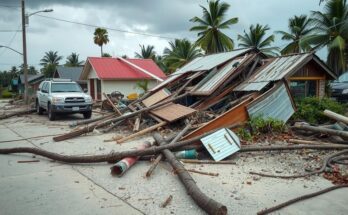Professor Sergio Chavez, an influential anthropologist and archaeologist, has dedicated decades to researching and preserving ancient cultures in the Lake Titicaca Basin of Bolivia. His commitment to community involvement and education has resulted in significant local empowerment, highlighted by bilingual education initiatives, archaeological training for local residents, and environmental conservation projects aimed at restoring Lake Titicaca.
Professor Sergio Chavez, an esteemed figure in anthropology, has significantly impacted the fields of archaeology and community development through his extensive research in the Lake Titicaca Basin of Bolivia. Beginning his journey at a young age in Peru, under the guidance of his father, he developed a profound passion for uncovering ancient history. His dedication led him to teach at Central Michigan University from 1982 until his recent retirement, during which he supported numerous students in hands-on archaeological research.
Chavez’s work was profoundly influenced when political instability in Peru necessitated relocating to Bolivia, where he initiated innovative research projects while navigating the challenges of being non-citizens. He collaborated with diverse specialists in fields such as paleozoology and ethnography, fostering international partnerships that benefited both academic research and local communities. A significant publication from this endeavor is “Managing Archaeological Resources” (2008), which encapsulates his philosophy on local community involvement in archaeology.
A notable achievement of Chavez was training local Aymara individuals in archaeological techniques, thus fostering traditional knowledge while preserving cultural heritage. Recognizing a gap in literacy among locals, he initiated a bilingual education program that translated educational materials into the Aymara language, successfully enhancing educational access for over 500 individuals.
In addition to excavating ancient structures, Chavez established a local museum to showcase archaeological finds, further entrenching the importance of local heritage. He also prioritized environmental concerns affecting Lake Titicaca, collaborating with CMU’s departments to monitor water quality and address contamination issues. His dedication persists as he continues to engage in archaeological and environmental projects with his wife, Stanislava Chavez.
Overall, Professor Sergio Chavez’s journey reflects a unique synergy between archaeology, education, and community empowerment, establishing enduring connections between the past and present and highlighting the importance of cultural sensitivity in scientific research.
Professor Sergio Chavez is an influential archaeologist whose work encompasses both the exploration of ancient cultures and community development in the Lake Titicaca Basin of Bolivia. His career was inspired by early engagement in archaeological practices in Peru and has been defined by a strong commitment to integrating local communities into his research. Chavez’s foray into Bolivia was prompted by political turmoil in Peru, leading to a focus on equitable educational opportunities and environmental sustainability within archaeological projects.
In summary, the journey of Professor Sergio Chavez from Peru to Bolivia is a testament to his commitment to integrating archaeology with education and community participation. His dedication to mentoring local citizens, promoting literacy, and preserving cultural heritage has created lasting impacts on the communities involved in his research. Chavez’s work underscores the importance of developing local partnerships and maintaining an environmentally conscious approach to archaeology, ensuring that both the past and present are honored and preserved.
Original Source: www.cmich.edu




